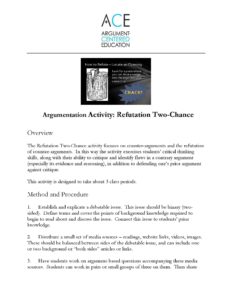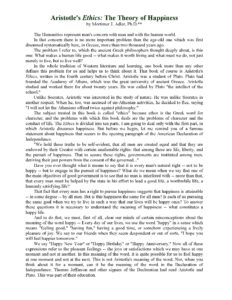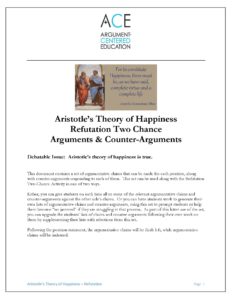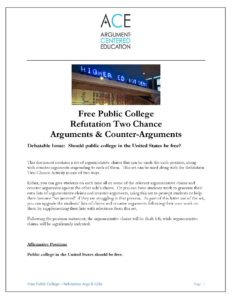
Claims and Counter-Claims for Use with the Refutation Two-Chance Activity
Overview
Refutation is probably the most under-appreciated, under-taught, and the most essential and irreducible of all of the components of academic argument. To Argument-Centered Education, refutation should be broadly conceived, but very rarely omitted from argument-centered instruction, or held off till later.
Defined capaciously, refutation is anything a writer/speaker does when they differentiate their own view from that of another view. In effect, when someone is agreeing with a difference, or partially agreeing, or partially critiquing, or anything else they do other than 100% complete agreement, we understand this as “refutation.” Writers or speakers are asking that their view substitute for the other person’s view — even if their view is the other person’s view plus or minus some small correction, etc.
Sometimes this quality of addressing another viewpoint in some direct way is defined in an argument context as “responsiveness.” Responsiveness is closely related, and is a criterion ACE uses for effective refutation, but there is in fact too much looseness out there on counter-argument. Rigorous argumentation cannot accept any old kind of response to the other side’s arguments. We want students to understand that their response either succeeds or not in replacing or modifying another view with their own — succeeds or not in “refuting” it, as long as refutation is given its broadest possible definition.
The Refutation Two-Chance (RTC) activity focuses on counter-arguments and the refutation of counter-arguments. In this way RTC exercises students’ critical thinking skills, along with their ability to critique and identify flaws in a contrary argument (especially its evidence and reasoning), in addition to defending one’s prior argument against critique.

Claims and Counter-Claims to Set Up and Scaffold RTC
We have been using Refutation Two-Chance with partner schools frequently of late. It has served partner teachers well as a routine in practicing students’ critical thought about an issue, and in habituating them to the engagement of the best arguments that can or might be made to oppose their arguments or their overall position on an issue. RTC has been a common activity to prepare students for their writing assessments — essays, papers, extended response pieces, AP testing, and the SAT essay domain.
We have found it very useful to work with partner teachers to create a set of strong claims for each side on an issue, along with viable counter-claims (distinguished from counter-arguments in that they do not yet have evidence or reasoning to support them). What follows are sets of sample argumentative claims that can be made on issues we have worked on recently, along with counter-claims responding to each of them.
These sets can be used along with the Refutation Two-Chance Activity in one of two ways. Either, teachers can give students on each time all or some of the relevant argumentative claims and counter-claims against the other side’s claims. Or teachers can have students work to generate their own lists of argumentative claims and counter-claims, using this set to prompt students or help them become “un-jammed” if they are struggling in that process. As part of this latter use of the sets, teachers can upgrade the students’ lists of claims and counter-claims following their own work on them by supplementing their lists with selections from this set.
Following the position statement, the argumentative claims will be flush left, while counter-argumentative claims will be significantly indented.
Issue: Aristotle’s theory of happiness, as laid out in the Ethics, is true.

Affirmative position: Aristotle’s theory of happiness is true.
Claims/Counter-Claims
Since happiness is widely recognized as the highest good, it has to mean something much more than mere transient pleasure.
Not true, pleasure may be the highest good in life.
The feeling of pleasure is biologically verifiable and therefore the most scientific way of defining happiness.
Being able to delay gratification is one of the most important techniques for attaining real and lasting happiness.
This doesn’t prove that pleasure isn’t the best definition of happiness. Delaying gratification just means that people will experience more pleasure later on.
This is artificially imposing morality on to happiness. Delaying gratification may make a person more virtuous, it doesn’t necessarily make them happier.
Historical figures who have lived the most fulfilled lives have seemed to radiate something like Aristotle’s version of happiness.
There is no way to know if this is true or not. People may want to believe that the great persons of history were happier than the average person, but we don’t know whether this is so.
Actually, the happiest people in our society seem to be the less virtuous. Rich people with all of their desires fulfilled are typically very different than people like Mother Theresa or Gandhi. Look at people like our pop stars, rap stars, movie stars, or even Donald Trump.
Negative Position: Aristotle’s theory of happiness is not true.
Claims/Counter-Claims
Aristotle cannot be correct since everyone has a different conception of happiness.
Truth doesn’t run for office; it’s not subject to a vote. The various ways that happiness is defined just means that various people are not thoughtful or enlightened about what true happiness is.
People have different conceptions of what they want – pleasure, power, material things, social status, etc. – but Aristotle would say that this simply means they want things other than real happiness.
Everyone experiences happiness as something transient, not something permanent.
Not true, people’s deepest feelings of happiness are when they reflect on a long period of time of virtuous living.
What the other side really means is that everyone experiences pleasure as something transient, and we agree with that. But pleasure is not happiness.
Aristotle’s theory is actually more subjective than the theory that happiness is related to pleasure, since there is no objective way to know whether someone has “lived in accordance with complete virtue.”
Being subjective or not scientifically provable doesn’t make Aristotle’s theory wrong. A lot of what philosophy studies for its truth value isn’t scientifically provable – for example, values, morality, how we know things, etc.
The whole point about happiness and the feeling of virtue is that it is personal. Aristotle is saying that only when we can judge ourselves as having lived virtuously do we experience the feeling of real happiness.

Issue: public college in the United States should be free.
Affirmative Position: Public college in the United States should be free.
Claims/Counter-Claims
College tuition costs have been growing very quickly in the past 20 years and public college today is unaffordable to most Americans.
Most Americans do not pay the college “sticker price,” and instead get offered financial packages that include aid, scholarships, loans, and work-study.
Calling college “unaffordable” is subjective: people pay for what they prioritize, and sending someone to college has always historically been a big financial sacrifice for families.
College has become a vehicle not for helping people move up the social ladder, but rather a cause of the ever-widening gap between the rich and the poor in this country.
There are many other causes of the divide between the rich and poor in the U.S. – such as crime, gangs, dysfunctional communities, failing schools – which means that free public college cannot by itself change the lack of social mobility.
If public college were free, the divide between rich and poor would continue through divides between “elite” and “common” colleges.
Student loan debt is becoming a major financial risk for our nation, and a major personal burden on young adults.
Getting a college education still massively repays students who have to take out loans over a lifetime of higher earnings that high school graduates, so for individuals loans are worth it.
The United States has not suffered any adverse economic consequences from having high total student loan debt these past 20 years or so.
More college graduates would be good for the economy overall, since they are more innovative, more entrepreneurial, and they earn much more during their lives.
Still, the cost to society of making public college free to everyone who wanted to attend would be massive.
It’s possible to have too many college graduates; the jobs the economy really needs today may not require a college degree.
Negative Position: Public college in the United States should not be free.
Claims/Counter-Claims
Most students not attending college currently are not academically prepared for college and might flunk out if they went to a free public college.
Those who are less well prepared could take remedial college classes their first year or two, so that they filled in gaps in their college readiness.
The United States could, at the same time it made public college free, try to fix public high schools so that all or almost all graduating seniors were college ready.
Targeted aid to low-income college students would be much fairer than making college free to all students, even wealthy ones.
Targeted aid to low-income students is not politically sustainable; middle-class and more affluent voters will turn against it because they get no benefits from it.
There isn’t enough targeted aid being offered to low-income people to make college truly affordable.
Governmental control over public colleges – the likely result of the government paying everyone’s tuition – would significantly reduce their educational quality.
Governmental control of other sectors – for example, of the military, of the postal service, of food regulation – has seemed to work out well, without complaints about widespread quality of services.
Colleges would still compete and try to be innovative and better than other colleges in the same way they do now, even if the government was paying everyone’s tuition.
The experience of other nations, especially in Europe, shows that making public college free doesn’t have many significant benefits.
In at least some countries, free public college has increase enrollment percentages in college.
European countries are different than the U.S. and have different histories and economies, so they two places cannot be compared.


